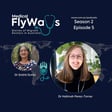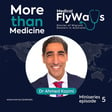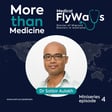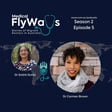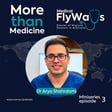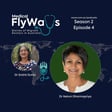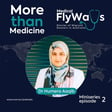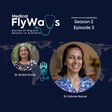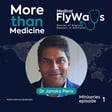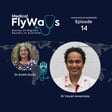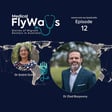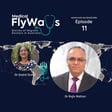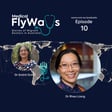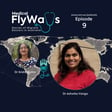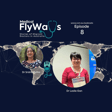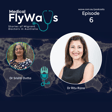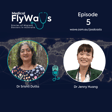Become a Creator today!Start creating today - Share your story with the world!
Start for free
00:00:00
00:00:01

Episode 7 - Dr Nisha Knot
Dr Nisha Knot is a consultant Obstetrician and Gynaecologist in Melbourne. In addition to her consultancy roles, she is also the Vice President of the Royal Australian and New Zealand College of Obstetricians and Gynaecologists RANZCOG and holds a number of governance positions within the college including for examinations, Women in Medicine and Women's Health committees.
Recommended
Transcript
Introduction to 'Medical Flyways' and Dr. Nisha Caught
00:00:01
Speaker
Medical Flyways, the untold journeys of migrant doctors in Australia.
00:00:13
Speaker
Hello, Nisha. Thank you so much for being on the podcast and for being as fabulous as you are. I've got today with me Dr. Nisha Caught, who is a consultant obstetrician and gynecologist in Melbourne. And in addition to that, she is the Vice President of Royal Australian College of Obstetrician and Gynecologist, Ranskog. She also holds several governance positions within the college, including for the examinations,
00:00:41
Speaker
as well as the Women in Medicine and Women's Health Committees. Now, Nisha, I might not have got that exactly right, so please feel free to put in a little more. I'll say a little more about your current roles and positions.
Dr. Caught's Roles and Governance Positions
00:00:55
Speaker
Thanks very much for having me, Srishti. You got that absolutely spot on. So don't worry about it. I suppose in addition to that, what I will say is that I'm the previous chair of the SIMG committee. That is something that I am very strongly interested in. And so that was the reason for being the chair of that committee. And now I am the deputy chair of that committee. So that's my other role. And of course, there's the clinical role of being the head of unit at Frankston Hospital, which is on the Mornington Peninsula in Victoria.
00:01:24
Speaker
Thank you, Anisha. I know I've heard about your journey on a different podcast and you've shared quite a bit in terms of the geographical you know meandering that's occurred.
Experience as an International Medical Graduate
00:01:36
Speaker
So like when you've gone from India to the UK and then arrived in Australia, and looking back at the journey, is there any particular highlights or any particular insights you'd like to share about that with our viewers or or more of it?
00:01:50
Speaker
Being an IMG, quote-unquote IMG, and I must say that I actually have a huge dislike for that term because it seems to be used more often for people who come from certain parts of the world versus not being used for people who come from other parts of the world, but being an IMG twice in the UK as well as in Australia has, I suppose, been an enlightening experience in some ways, good and bad.
00:02:16
Speaker
I'm an optimist at heart and so I tend to focus on good things and I think most people tend to be like that because that's how we wake up in the morning and keep doing the things that we do. But from the experience of moving to the UK, so I went to England on what used to be called the overseas doctors training scheme at the time. This is you know now going back to the year 2000, 2001 and this was a scheme whereby the UK allow doctors from other countries to come and work in the yeah uk for a couple of years usually to get some extra training and then to be able to go back to their home countries with that training and use that in their home countries now the intent was obviously for people to come get some extra knowledge and training and go back but most people use this pathway as an entry pathway to get some
00:03:07
Speaker
local experience to then be able to stay in the system and be able to function and continue to work there. And I can remember that my first job that I worked at, obviously people could see that I had already got a whole lot of experience and I was a safe pair of hands. So the first job I was at, I was asked if I would want to be a staff specialist and stay at that hospital.
00:03:30
Speaker
Now, for people who don't know, in the UK, the staff specialist role is sort of a non-consultant, but specialist role. And in those days specifically, it used to be basically condemning you to a life of a registrar for the rest of your career, because you would never progress to being a consultant from that role. That's true. Arriving at a later date, what was referred to as service grade, meaning you're here to serve at this level and we ensure you certain aspects like a pay at this grade but there's no further progression. Absolutely and I suppose in Australia the equivalent would be a career medical officer grade. But again at that time I was very fortunate that one of the consultants I worked with at that hospital was an IMG himself and he took me aside and he said you know what Nisha of course you could take this job. And if you take this job, you will have certainty of you know having a job in this particular organization, in this city, for the rest of your life. A good salary, a good life, yes, you will have all of those. But you know what? In a few years, you will get frustrated because you will see your registrars much junior to you progress, go ahead of you, and become your, quote, unquote, bosses.
00:04:43
Speaker
and You will feel very frustrated with that. and so My advice to you is that don't take this job offer. Anybody anywhere in this country will give you a staff specialist role if you decide to do that. But right now, I think you should continue to progress your career. You should apply to get on the training program in the UK and aspire to be a UK consultant.
00:05:06
Speaker
and I, at the time, thought, well, this is great advice, but is this what I want to do? is this you know Do I have it in me to do you know another five, six, seven years of being a registrar and doing exams and doing all of this? On calls and night shifts and yeah all of that.
00:05:24
Speaker
However, the other side of it is that if I take a staff specialist job, I will be doing this job for the rest of my life. So it's not as if I'm going to get away from it. And so I thought, you know what, I will do this. I will try and get on the training program and let's see how we go.
00:05:40
Speaker
And at the time, actually in the UK, for the first time, I was exposed to a general practice
Journey and Challenges in Australia
00:05:46
Speaker
training program. This was not something that was warm in India. So I didn't even know that there was something like this that existed. And so in my you know great wisdom, I applied for both the general practice training program as well as the O and&G training program.
00:06:00
Speaker
Fortunately got interviews for both of the training programs and got offers for both the training programs and when it came to making a decision about which training program to join I couldn't let go of the ong that i had done for so many years in india that i was passionate about and so i decided to go down the ong training program in the uk.
00:06:21
Speaker
completed the training program including all of the requirements of the training program exams everything else got to the end and got that little piece of paper the CCST certificate of specialist training and could have stayed in the UK. But to you know my husband was moving to Australia for a research fellowship job, and I thought, well, I'll go along with him and see how I go. Very quickly coming to Australia, I realized the difference between the system in the UK, because the UK was very clear. If you wanted to stay, there were two options. You either took the staff specialist job, or you tried to get on the training program, and that's how things went.
00:06:58
Speaker
In the UK, on the other hand, what was involved was applying to the Royal College of ONG because I was an ONG, submitting all the paperwork and then getting assessed based on the paperwork for whether you were eligible for an interview or not eli eligible for an interview.
00:07:16
Speaker
And then going to an interview where you were asked a range of questions about the training you had had, about your current practice, about your CPD, things like that. And then the panel, the interview panel, would decide if you were not comparable at all, which meant that you had to go through the training program in Australia, substantially comparable, which meant that, yes, you were equivalent to a new consultant of ONG in Australia, but that you needed to practice with supervision for a period of a year before you given your fellowship, or the third option was that you might be partially comparable, which means that you would be comparable to perhaps a senior registrar in Australia, so you would have to work as as a senior registrar for two years, do your exams, do more requirements around ultrasound and colposcopy to then be allowed to get that piece of paper that says your fellow of of the Royal College of ONG in Australia and New Zealand.
00:08:12
Speaker
So that is the process now part of the problem with the process is that this is a surgical specialty now i can't say anything about non surgical specialties because i can only speak to my specialty this is a surgical specialty where an assessment is interview based. Of course, you have your logbook. Your logbook says how many procedures you've done of different kinds, but ultimately, the assessment is an interview-based process. Now, in an interview, I could sit there and say, of course, I can do Procedure X, and I've done 20 of those. My logbook says I've done 20 of those.
00:08:49
Speaker
i'm competent and confident at doing this procedure x. But ultimately, that is no way of kind of recognizing if I can do procedure x or not.
00:09:01
Speaker
I can also confidently say that I can do the whole range of obstetrics and gynecology from the basics to the most complex things. And here's my logbook that shows I've done all of that. Again, not a very good way of actually assessing whether someone is you know able to do that procedure or not. So that brings into it a lack of subjectivity and brings into it the feeling of the panelists as to how honest you are being about what you're saying.
00:09:30
Speaker
Which can be problematic because you know of course as doctors by and large we're honest about what we can and can't do but they might be people who might not be as honest about what they can and can't do and might not have insight. Absolutely they might not recognize those.
00:09:46
Speaker
specific areas of deficit or requirement as well absolutely and so actually that twelve months supervision period is a really good thing to have in place and you know whether we say it's six months twelve months whatever duration we decide that supervision actually does help not only a doctor to settle into the Australian system because even if you come from the UK, the Australian system is different, so you need some help in understanding the specifics of how the system works. But it also ensures that wherever you work has the ability to recognize your abilities, surgical as well as clinical as well as communication skills abilities, and be able to provide you with the support you need to make sure that you are up to the standard.
00:10:32
Speaker
and I think the what what should happen and perhaps doesn't happen as well is the process of credentialing in individual hospitals. Now, there is a role for obviously the college to say, yes, this person based on their paperwork and their interview is substantially comparable and can work as a consultant.
00:10:53
Speaker
But that doesn't take away from the role of the actual hospital where they're working to do some credentialing around making sure that person is a safe practitioner who's going to perform surgeries, who's going to see women in clinics. And I think the two need to go in parallel and we can't replace either one with the other. So we can't say that just because the college has said this person is substantially comparable, that means off you go, you're a consultant, you do everything, you don't need any supervision, you don't need anybody to sign you off for anything and we also can't say well actually it's not the college's role to say anything everything should be based on credentialing because there is a role for making sure that that person has had the appropriate training and the appropriate number of procedures to be able to at least on paper have the skills to perform the procedure so i think it's very important to marry these two things up
00:11:45
Speaker
Yeah, and I think probably what you're saying is the standards of training are one thing and the actual application of that learning in a particular system and context is different and still needs to be supported even if someone has all the skills and knowledge that we have assessed. So that place-based support is still relevant. and And maybe what you're also saying and is there's got to be a relational willingness on both sides to collaborate on this and assist each other's role rather than see them as being complementary rather than. Absolutely and especially it's not just for um IMGs, it's for local graduates as well. It should be the same process and I think that's where IMGs sometimes feel like we are being targeted because different
00:12:37
Speaker
systems and different rules seem to apply to IMGs versus local graduates and I think actually that it is true of local graduates as well. Just because they have done a training program in Australia and been signed off to do certain procedures doesn't mean that as a consultant they shouldn't have the same process of credentialing, making sure that they are safe.
00:12:58
Speaker
Yeah, I agree. And I think that's the challenge is when you're new to a system, you might understand the medicine but not the system well enough to both do the best you can as well as advocate yourself the best that you can.
00:13:12
Speaker
Absolutely true.
Mentorship and Career Reflection
00:13:13
Speaker
Now, looking back to when you left India, do you think there's something you would have said to yourself at that point that would have made this journey any easier or any less frustrating? Or you know ah what was it that you said to yourself on the way when you did have obstacles or when things didn't go your way?
00:13:32
Speaker
So one of the first things I said to myself was that this was my choice. you know The fact that I'm either in the UK or in Australia is an active choice I made. I had trained in India. There was no reason why I wouldn't get a job as a specialist in India. I could have stayed there and I would have had a reasonably decent life. you know And it would not have been an awful life by any means.
00:13:56
Speaker
And so the choice was mine. And if once I have made a choice, then I have to accept, I guess, the difficulties and challenges that come with that choice. But also having made that choice and accepted those challenges, I've got to work to make sure that when I overcome those challenges, but that also I create a path that helps others overcome the challenges.
00:14:19
Speaker
You've said that in a very simple way and it leads to my next question. is Did you have you mentioned one person who you know sounds like of their own bat to cure side and shared their wisdom with you? I am sure there must be people that you've supported alongside your journey. Did you have any particular mentors or people that guided you in ah mentors, obviously, I believe the official version is they guide you in your personal life choices as well as career life choices and have you mentored anyone as well.
00:14:50
Speaker
So certainly, I think I've had some really great mentors who have sort of pointed me in the right direction or, you know, gently said to me that perhaps this is not something that you would choose to do, things like that. And again, going back to the sorts of things that I was interested in. Now, obstetrics and gynecology is a very, very broad field. And within that, most of us will find certain things of interest and other things, perhaps not so much of interest.
00:15:18
Speaker
So for me, my interest lay in the interconnection between general medicine and pregnancy. So sort of the obstetric medicine side of things, maternal medicine side of things. And in gynecology, it lay in vaginal surgery. And very early in my career in the yeah UK, you know in India, it was still possible to do a combination of obstetrics and gynecology and do like really disparate things. like There's no connection between maternal medicine and vaginal surgery, realistically speaking.
00:15:46
Speaker
but in the uk very early in my career one of my mentors said to me you know what nisha i can see that these are your two areas of interest and that you are good at them but these are not two areas that you're going to be able to combine in a realistic way to be able to do the best that you can in both these areas And where this person was coming from was the fact that in the UK and of course now in Australia as well, there is a subspecialty of maternal and fetal medicine, which deals with the maternal medicine side of things. And then there is a subspecialty of urogynecology that does sort of the vaginal surgery and those you know pelvic floor surgery. And you can't do two subspecialties. That's just choose one. Yeah, that's conventionally. yeah Absolutely.
00:16:29
Speaker
And so that meant that very early I could make the decision that, you know yes, it was a difficult decision, but actually the maternal medicine was what was more interesting to me than vaginal surgery. And so then my career path and my training path went down that route. I did a fellowship in maternal medicine in addition to my training in the yeah UK to get that extra experience and knowledge, which was really helpful. And the plan had been to do ah do the maternal medicines subspecialty.
00:16:59
Speaker
As it turned out, that didn't happen because you know life happened instead. yeah We moved to Australia and so the option of staying in the UK and continuing to do that MFM subspecialty kind of fell by the wayside and then coming to Australia meant that I had to get a job first of all and so then again the job was a generalist obstetrics and gynecology job with more of a focus on obstetrics and so I decided you know what even if I don't do the subspecialty I've done the extra training in maternal medicine I wasn't interested in fetal medicine as such I was more interested in sort of the diabetes hypertension those ah sorts of things in pregnancy and so I use that knowledge and skills to
00:17:42
Speaker
continue working in the field in australia and you know i i haven't regretted not doing maternal fetal medicine you know occasionally i feel why should i have done it maybe i should do it now maybe i should find a role where i can you know retrain in the fetal meds inside of which has fallen by the wayside but those are usually fleeting moments I love that. I love the what-ifs that plague us all at points. And just to share one thing that yesterday, a friend of mine was on the phone to me and she said, oh, Srishti, if you did things over, would you have finished your psychiatry training? And I very confidently said, yes, I would have. But then I had to go back to her and say, look, I haven't lost the interest or the skills. And you're so right. You don't leave everything because you change directions. You take it with you.
00:18:27
Speaker
You just find ways of doing the things you like to do in different ways. Absolutely. and and Make the most of whatever you learned in the process. so Completely agree. so As will most of my patients who have complex mental health issues, so they might not realize that I have extra training. Totally. Exactly. You use those skills right on an everyday basis. and That's great. Great for your patients, great for you. and In terms, Shrishti, of me being a mentor to others,
00:18:56
Speaker
I'm very strongly in the camp of wanting to be a mentor to people like myself so you know that of course there is the experience but also there is that ah feeling of these are my people and so yes i definitely have taken on mentoring roles usually they have been sort of informal they've just been.
00:19:18
Speaker
and organic, but there was also a very nice Link and Grow mentoring program run by my colleague in Canberra, which was a specific mentoring program, a kind of a scheduled mentoring program targeted at women doctors from culturally and linguistically diverse backgrounds. And I thought this is a really good way of making sure that generally women who come from you know our kind of backgrounds are very reluctant to seek out mentors because we feel like, you know that why would I ask someone that person probably has a very busy life? Why would they want to do this for me? And so in that sense, I think having that structured program was really useful.
00:19:57
Speaker
Yeah, I agree. It feels like you're and you it's an imposition on the other person. And i think i'm completely I think the Link and Go program is still going. This is DFTI, I think, is that right? Yes. And Canberra, in association with support from ANU. So there are initiatives of that nature, which there are a few. and and And then when you go looking, you do find them. So I'm glad we arrived on that one. And I know I've been in touch with her, but haven't actually formally manage to do anything, would you believe it? I think today you know in the mentoring space, it's very important how these programs are structured. Because again, to reflect on the fact that Ranskog wanted to set up a mentoring program specifically for IMGs, which makes a lot of sense. it was you know The intention was really good to say to IMGs, you know here's a mentoring program, we'll pair you up with a mentor, whom you can contact if you have any issues.
00:20:53
Speaker
The problem is that so many of us come from countries where colleges or their equivalents have a role of actually keeping an eye on us to make sure we are not doing anything bad. And so when this mentoring program comes from the college, which many IMGs will view from the lens of their home countries,
00:21:14
Speaker
and comes as a thing that is directed towards IMGs, there is a natural feeling of, oh, is this somebody wanting to keep an eye on me, making sure I'm not doing anything wrong? And so then it changes the tone of what you are trying to achieve. And so then it doesn't you know work the way you intended it to be. Yes. Absolutely. And so it's very important to take into consideration those nuances. And sometimes the only way you learn that is by actually making the mistake of you know putting it in place and then thinking, why is no one taking it up? I've set up a really good program. Why is no one interested? And then you unpack why you're not getting any interest.
Advocacy and Leadership in Women's Health
00:21:52
Speaker
I think the I've seen another aspect of that, and I'm glad you brought it up, which is the you know the intentions go to occasionally, they're matched appropriately as well. But I think
00:22:01
Speaker
you know Thinking of colleges in our countries of origin, shall i call it there are expectations that can happen in terms of being connected with someone who has a position in the college or a role in the college. which is you you know seeking assistance that is not within your capacity. you know In terms of specific things, I know that one of the mentoring programs that I was part of, there was some clear messaging that had to be put in place regarding financial assistance, regarding assistance with things outside of our control like visas and sponsorships for jobs. so
00:22:35
Speaker
So it can be tricky because even though you're here, particularly sometimes when when the IMG is not in the country, because if they're not here, it really does limit your ability to support them as a mentor as well. Absolutely. Yeah, so you're right. It it does often need to have clear parameters and boundaries and and an idea for both the person that seeks that mentee mentorship as to what they can and can't get from it.
00:23:00
Speaker
But yeah, i I like the idea of, don't don't like the idea of being a big brother and being watched over, but I had not considered that, I must admit. There's an element of pride that I have interviewing you, shall I say, that there are few women and particularly women of color who we see in positions and roles of leadership in medicine at the moment.
00:23:24
Speaker
I know when we've shared interactions on social media, I've mentioned Dr. Vasanta Pritam, who was a college of the RACGP a while back, and she's actually you know not directly involved with the college anymore. She's still a GP.
00:23:37
Speaker
and asked Dr. Tomer, who is the ah president for the College of Psychiatry, and then, of course, yourself. And I often wonder. And Srishti, the current president of the RACP, the College of Physicians, is also a woman of color. So you know, our breed is growing. Yeah, so i I kind of think and look at that and go, wow, this has all happened in the last, what, decade, I would think that. And just to put in context that you know people in these roles don't arrive at it one morning. but So I wonder if you were happy to share your journey of arriving at a leadership role or you know how organic or inorganic or you know what was it like?
00:24:19
Speaker
So first of all, my experience as an IMG and you know going to the college to ask for recognition of my training, et cetera, left to me feeling uncomfortable, to say the least, and made me feel like this is a system that isn't working very well and needs to take into account a few other things in addition to what it is currently taking into account. And that's where the seed was sown. It was you know wanting to change how the college works in the IMG space specifically that prompted the kind of interest but you know initially when you come to Australia it's a new country or in a new job you have family to settle and nothing else really enters into your you have this little seed in the back of your mind but you don't actually put anything behind it you say yes one day I'm going to do that.
00:25:09
Speaker
And then a few years down the track ah at one of the conferences there was a presentation again from one of my colleagues who done her masters in leadership and women in leadership and she had this presentation at the annual scientific meeting of ransco.
00:25:25
Speaker
which clearly showed how we were such a women-dominated specialty, as in there were more and more women specialists as well as trainees, somewhere close to about 70 to 80 percent of our trainees are women, even higher sometimes. But leadership at the college and leadership in ONG hospitals, as in head of units of hospitals, was still predominantly male.
00:25:47
Speaker
and that really got me thinking of you know how how can that be if eighty percent of our trainees are women fifty percent of our fellows are women then why are they not in leadership what's holding them back and that kind of planted another seed, and I think once there were two seeds, it was really difficult for them to not germinate. The next time the college rolls came up for election, I said, well, I'll put my hand up. What's the worst that can happen? I won't get elected, like right? you know it's It's not at the end of the world, but if I get elected, how exciting would that be? And fortunately for me, I did get elected.
00:26:26
Speaker
Once I got elected, got involved in the work that the college does, that was when I started to recognize that there was so much more that I was interested in, so much more that I could do. And so from there has come this journey of you know kind of doing first the role of the counselor for Victoria, then going on to join the board, then going on to becoming vice president. It has all come from a place of actually wanting to make sure that The college does what its role is, yes, but also colleges have traditionally only focused on the training aspect and the sort of you know training and CPD have been the two things that colleges have done. But we can be the voice for women's health. After all, we are the ones who look after women's health day in and day out. And we should be the voice for women's health. And so bringing into our remit the role of advocacy,
00:27:20
Speaker
has been something that I have really, really been very passionate about. and I'm very glad that Transcorg now acts as an advocate and speaks up for all the issues that affect women's health, whether it be Medicare, whether it be PBS, whether it be actually training doctors of the future, making sure rural and regional maternity units stay open. Those are all the things that make a difference to women's health every day. and I think that should be our role in addition to being the trainers and the CPD people.
00:27:50
Speaker
outside of education. ah absolutely yeah and so Did you feel ready and prepared for it when it happened? you know Again, I think we're very naive when we put our hands up for various roles. so Similar to the college role, I also put my hand up to be a director of ONG in a unit in Victoria. and Again, we our training doesn't prepare us specifically for leadership and our role models or what we have seen happen over the years is people get to a certain point, they have a few gray hair.
00:28:22
Speaker
leaders and so I think I was very naive in both taking on that leadership in the clinical space as well as taking on leadership in the college space. I didn't have any particular training in leadership and it was only after taking on those roles that I realized hang on these roles are very different from just being an obstetrician gynecologist.
00:28:42
Speaker
and So then I sought out the sort of training that might help me. I sought out mentors who would help me and who would be able to point me in the right direction to get the right skills and knowledge to be able to do these roles. and So in a clinical director role, there is a whole different set of leadership things that you need to know. Whereas being a leader within the college, there's a whole different set of things that you need to know. and I think I'm still learning those things that I need to know because I start to think, oh, yeah, now I know this and then something else comes up and I go, my God, I'm clueless about this. Yeah, absolutely. I think, though you know, you said you're a bit naive. I think this probably describes a lot of people that take on something new, but you you do still have to have a certain risk taking ability. And, you know, shall I say, having done two continents over, I'm sure you had that already. so
00:29:36
Speaker
Yes, there is that feeling of, again, know what have I got to lose? Yes. I won't get the job. Fine. That's the worst that can happen. I will still have a job. I will still have an income. I will still have the ability to do what I like doing. So you know that kind of gives you a little bit more ah confidence, I guess. I'll apply for it. And if I don't get it, it won't be the end of the world.
00:30:01
Speaker
that's very true i think you're right in saying that you know representation does matter and as they say if you see somebody you can believe that you can be there as well so yes and especially you know often leadership roles first of all you don't see many women of color that is of course the truth but you often see people who have you know very academic backgrounds they are professors you know they have a huge name in research those are the sorts of people you often see in leadership positions now i'm not that person i'm not a professor i'm you know not even an associate professor none of those things i'm not an academic i don't do research as a you know regular part of my work
00:30:41
Speaker
But for people like me, and the vast majority of clinicians are like me, they are not in the space of doing research or being academics. There is a place for leadership for people like us as well, and I think that is the other side of it. So yes, of course, there is the women of color seeing somebody like themselves in a role of leadership and thinking, yes, if that person can do it, then I can do it. But it's also for what I would call the garden variety doctor. Clinicians.
00:31:07
Speaker
is like I like that description, although they might not, but I know what you're saying. You know, it's good for that person to also feel that if someone like me can be a leader, then why can't I do the same thing? Yeah, and I think it's important because they are actually at the core phase of delivering healthcare care and they are in the swamp, as one of my colleagues would
Balancing Medical Careers and Self-Care
00:31:28
Speaker
say. so to be able to inform decisions and choices that are being made that will affect them directly or indirectly, hopefully does prompt people to think about it. Now, I also know that you're a medical family, which means you're both doctors. and So how does one balance two people that do full-time plus roles and everything else that we're told life should be? Self-care and you know make sure the kids are okay and all the rest of it. How does that happen?
00:31:56
Speaker
I say this all the time when people ask me, you know how do you manage work-life balance? And I say that work and life are not different. Work is part of life, and it should be part of life. Choose a job that you love doing, then it will never be something that you have to balance against something else. So that's one thing that both of us absolutely a hundred percent perhaps a thousand percent enjoy what we do and love what we do and that reflects in our lives and the children pick up on that they can see that their parents love what they do and so if their parents are not around for some event that's happening they themselves can see that that is.
00:32:37
Speaker
For a good reason and so you know that that is where it comes from that of course I and I'm not going to say that we haven't had our challenges of course we have there were times when I didn't work full time because it was difficult to juggle the mothering and parenting as well as work you accommodate that as well you accommodate that as well and then once the children are older you go back to doing the things that you enjoy doing I think we shouldn't take it as a struggle to achieve balance. I think balance comes when we know what our priorities are and we make sure that those priorities and those priorities change over time. so you know We accommodate for the priorities based on where we are.
00:33:20
Speaker
Yeah, that sounds very, very wise, should I say. And accept that sometimes it won't work out. Look, I see this now, but there were times in my life when I honestly thought, you know what, I don't want to work. I just want to give up work and stay home.
00:33:35
Speaker
But, you know, that those pass. They're temporary. If you love what you do, you're obviously never going to give up what you do because you love doing it. So you will go back to it. And if you have to take a couple of years off, so be it. You're not going to lose all your skills. Yeah. And i I agree with you in that there is no fixed formula that gets it right and always works. It's a dynamic process that, you know, if you give it enough space, it tends to work itself out.
00:34:00
Speaker
Yes. and Trainees will you know sometimes ask what is the ideal time to have a baby in this whole process of training and getting through your training. and I actually say that you know all times are bad times and all times are good times. so There is no ideal time.
00:34:17
Speaker
I agree and I have said that yesterday on social media so we are completely in agreement on that there is no and you're an obstetrician and gynecologist is there ever a right time to have a baby? Exactly for me in fact it is a that is more of a concern than the right time based on your training because as an obstetrician gynecologist I know that as we get older our likelihood of one getting pregnant spontaneously to having complications goes up.
00:34:42
Speaker
going up so you know what the right time is actually right time medically rather than in your training time. Yeah I agree and I think it's tricky to give advice on this when there's so many other factors that are not within people's control as well so yes I like that idea of work life not being a balance but work being part of life and Now, self-care, is that a term that you were aware of before you left India? No, in fact, it was not a term I was aware of till maybe a couple of years ago when it became the new thing to talk about. And so what does that look like? What did it look like before you realized there was such a thing as self-care? Because I did at one stage think that it was something new until I realized, well, actually, no, I just didn't call it that.
00:35:26
Speaker
Yeah, exactly. I didn't call it that. Of course, I would take time out. I would you know have time with my kids. I took a whole year off of maternity leave when my son was born. It was a fabulous year because my daughter was almost seven at the time. So you know although I had a little baby, I was actually bonding with the seven-year-old more than anything else, which was great. So we've always done self-care. We just didn't call it self-care. We've always had you know a really tight group of girlfriends that I would get together with.
00:35:55
Speaker
but Very regularly, I had you know parents, family that came and stayed with me that I would visit regularly, so we've always done self-care. Is there anything that you do just by yourself that you think is part of that? so ah The thing with self-care, the one thing that I have started to realize late in life is that it is important to have physical activity. Now, that is something that, again, when I reflect, I think back to my years of growing up in India,
00:36:24
Speaker
And as a girl, and as a, you know, studious girl, quote unquote, I was not athletic. And so at school, I would be the last one to be picked to be part of a team. If they could get away with not having me on their team, that would be better because And let's be honest, I was terrible. I was terrible at team sport. I was terrible at individual sport. and It was just not my thing. And so, you know, I very early in life decided I would play to my strengths and I liked studying. I liked my nose in a book. So while everybody else was on the playing ground playing, I was sitting and reading because that is what I like doing.
00:37:02
Speaker
And of course in the indian context once you hit puberty there was very much the thing of you know now there's no need to wear shorts and you must wear you know long trousers and so there was a lot of barriers to yeah barriers to and ah and an embarrassment about your body basically.
00:37:19
Speaker
And so you just wanted to hide. And books were a great place. Libraries were a great place to hide away from all of this. It's only getting to my 40s that I've realized that physical activity is so important for good health, both physical and mental good health. And it's not easy after a lifetime of sitting on the couch, sitting on a chair in a library to get up and start doing physical activity in your 40s when you've never done it before. And that has been my biggest challenge. And I'm trying.
00:37:48
Speaker
People who know me will know that every Saturday morning at 8 a.m., I'm at Park Run. Now, it says Park Run, but Park Run actually welcomes people who walk, who walk very slowly, run very slowly, do a run-walk, whatever combination, and that is the reason I go there, because it is a welcoming community. In any other space, usually where sport and athletics is involved, there's a lot of competition, and I would shy away from that competition.
00:38:16
Speaker
I'm not the sort of person who will say oh yes the last time i did it in 40 minutes now i'm going to do it in 38 minutes old you know that's just not me and so that's where that love for park run in particular has come from and from there it has led to other places other groups which are inclusive where i feel like physical activity is possible within that inclusivity and without feeling either that you're not good enough or being embarrassed about the way your body looks, all of those sorts of things. And I think they're really important, especially for women of color because we have all probably grown up with similar sort of experiences and similar feelings about our bodies.
00:39:00
Speaker
Yeah, absolutely. I completely agree. We haven't got a park run, but it's coming soon. So I'll keep an eye out for that one.
Advice for Aspiring International Medical Graduates
00:39:07
Speaker
Now, before we conclude, there's one thing I wanted to ask is if there's somebody highly likely sitting in a country which may not automatically be considered comparable to the health system of Australia that is thinking, well, I want to be an ONG and I want to consider going, leaving my country and going to, we have a usual list, USA, Canada, UK, New Zealand.
00:39:27
Speaker
Australia, what would your top tip be for them? What are the things they need to think about? First of all, get a solid ONG training in your country of origin, because actually our countries provide the sort of training, especially surgical training that you wouldn't get in any other country. You know, the countries you've listed, for example, you wouldn't get that sort of training, especially surgical training in those countries because there is in the volume. Patient numbers, yeah. So I can speak for India, but of course, similar conditions exist around many similar countries where there is a volume of surgery and a volume of pathology that will give you a very solid grounding in your ONG practice. Also, we don't have access to all of the fancy modalities of investigations. So often it is clinical skills that you will hone. And once you have honed those clinical skills, they will hold you in good stead no matter where you
00:40:26
Speaker
The second thing is that if you want to go to a particular country, get to know what the process in that country is. If you can approach somebody who's already in that country, who comes from your sort of origin, so they'll be able to share their journey with you, but find out what the process is because the process is very different for different countries. And that actually determines whether you might want to go to one country versus another country, depending on what that process involves and what you might be willing to do.
00:40:56
Speaker
and The third thing I would say very strongly is that remember, just like I said, it was my decision. Remember, it is your decision. If it is your decision, you have to be willing to make sure that you can put up with the challenges and difficulties, and there will be many. Once you do get to that point where you are in the country that you're going to You know plan to move then find yourself local mentors be willing to learn be humble because again what i sometimes see is people who come from overseas come with this thing of actually i can do all these surgeries i've done all these surgeries i'm a great surgeon but you know what are countries often don't teach us is the ability to communicate to communicate clearly to communicate with empathy.
00:41:42
Speaker
because in many of our countries, we as doctors are considered to be the people who make the decisions. That process of informed decision-making or shared decision-making is something that we don't learn, and that is something that we have to teach ourselves. So be humble, learn from your colleagues, see how they do it, and learn from them so that you can be good at it. and We know that in Australia, as well as in you know most Western countries, patient complaints come from a lack of communication.
00:42:12
Speaker
They don't usually come from the fact that the surgery didn't go well or there was a complication of surgery because we all know that surgeries come with complications, birth comes with complications. Where we stumble is in communication and most of our complaints are related to communication.
00:42:28
Speaker
So it's very important that we get those skills so we are able to communicate with patients to be able to tell them the things that they need to know in a way that is easy for them to understand and helps them make a decision that works for them. So those are my tips for people who want to do ONG and want to leave their home country and move to another country.
00:42:49
Speaker
Well, I shall call them Nisha's top tips and they are awesome.
Conclusion and Invitation for Future Guests
00:42:52
Speaker
Thank you so much. It's been an absolute pleasure talking to you, Nisha, and I'm sure that I'll have the pleasure to see you meet to you face to face one day. Look forward to that. Soon, sooner rather than later. but Indeed, indeed.
00:43:07
Speaker
Thank you for having listened to this episode of Medical Flyways. I hope you have enjoyed this episode and will return for future ones as well. We would like to give you the opportunity to nominate a guest or any person you feel who is a suitable guest and who may have inspired you in your workplace or journey. So please leave us a comment and we will attempt to invite them to our podcast.
